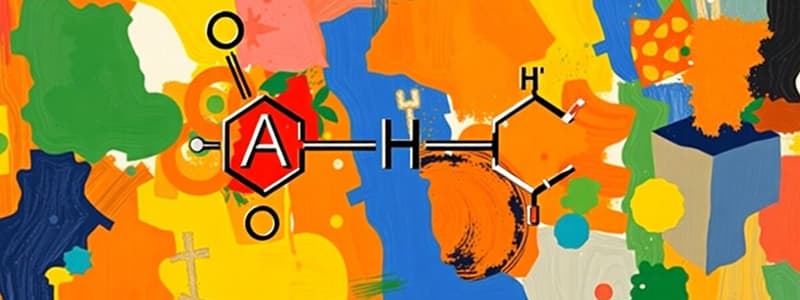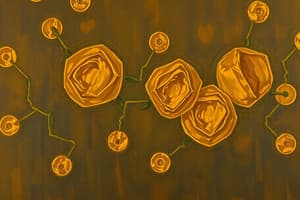Podcast
Questions and Answers
Alkenes are more reactive than alkanes due to the presence of a weaker π bond in the C=C double bond.
Alkenes are more reactive than alkanes due to the presence of a weaker π bond in the C=C double bond.
True
The typical reaction of alkenes is ______ addition reactions.
The typical reaction of alkenes is ______ addition reactions.
electrophilic
What is the main reason why alkenes are more reactive than alkanes?
What is the main reason why alkenes are more reactive than alkanes?
What type of species are attracted to the electron-rich center of the C=C double bond in alkenes?
What type of species are attracted to the electron-rich center of the C=C double bond in alkenes?
Signup and view all the answers
Match the following terms with their descriptions:
Match the following terms with their descriptions:
Signup and view all the answers
What is the primary structural requirement for a molecule to exhibit cis/trans isomerism?
What is the primary structural requirement for a molecule to exhibit cis/trans isomerism?
Signup and view all the answers
Cis and trans isomers have different chemical formulas.
Cis and trans isomers have different chemical formulas.
Signup and view all the answers
In a cis isomer, are the substituent groups on the same side or opposite sides of the double bond?
In a cis isomer, are the substituent groups on the same side or opposite sides of the double bond?
Signup and view all the answers
The rotation around a carbon-carbon double bond is generally ______.
The rotation around a carbon-carbon double bond is generally ______.
Signup and view all the answers
Match the isomer type to its description:
Match the isomer type to its description:
Signup and view all the answers
What is the functional group of alkenes?
What is the functional group of alkenes?
Signup and view all the answers
Alkenes are considered saturated hydrocarbons.
Alkenes are considered saturated hydrocarbons.
Signup and view all the answers
What is the general formula for alkenes?
What is the general formula for alkenes?
Signup and view all the answers
The first member of the alkene series is ______.
The first member of the alkene series is ______.
Signup and view all the answers
Match the alkene with its boiling point:
Match the alkene with its boiling point:
Signup and view all the answers
What is the primary difference between cis and trans isomers that affects their boiling points?
What is the primary difference between cis and trans isomers that affects their boiling points?
Signup and view all the answers
Trans isomers have a higher melting point because they pack more efficiently in the solid state.
Trans isomers have a higher melting point because they pack more efficiently in the solid state.
Signup and view all the answers
What type of intermolecular forces are present in both cis and trans isomers?
What type of intermolecular forces are present in both cis and trans isomers?
Signup and view all the answers
The shape of the cis isomer is often described as ______, which hinders efficient packing in the solid phase.
The shape of the cis isomer is often described as ______, which hinders efficient packing in the solid phase.
Signup and view all the answers
Match the isomer type with its corresponding property:
Match the isomer type with its corresponding property:
Signup and view all the answers
What is the primary catalyst used for the hydrogenation of alkenes?
What is the primary catalyst used for the hydrogenation of alkenes?
Signup and view all the answers
Alkenes do not react with bromine solution under normal conditions.
Alkenes do not react with bromine solution under normal conditions.
Signup and view all the answers
What does the reaction between ethene and hydrogen produce?
What does the reaction between ethene and hydrogen produce?
Signup and view all the answers
The process of converting vegetable oil into margarine is known as _____.
The process of converting vegetable oil into margarine is known as _____.
Signup and view all the answers
Match the following reactions with their descriptions:
Match the following reactions with their descriptions:
Signup and view all the answers
What product is formed when ethene reacts with concentrated $H_2SO_4$?
What product is formed when ethene reacts with concentrated $H_2SO_4$?
Signup and view all the answers
Halogenation involves the reaction of alkenes with halogens to form alkanes.
Halogenation involves the reaction of alkenes with halogens to form alkanes.
Signup and view all the answers
What is the byproduct produced when refluxing hydrogensulfate(VI) with water?
What is the byproduct produced when refluxing hydrogensulfate(VI) with water?
Signup and view all the answers
The process where ethene reacts with hydrogen halides is known as __________.
The process where ethene reacts with hydrogen halides is known as __________.
Signup and view all the answers
Match the following reactions with their corresponding products:
Match the following reactions with their corresponding products:
Signup and view all the answers
What is the temperature required for the dehydration of alcohols to form alkenes?
What is the temperature required for the dehydration of alcohols to form alkenes?
Signup and view all the answers
Dehydration of alcohols can occur without the presence of a β-hydrogen.
Dehydration of alcohols can occur without the presence of a β-hydrogen.
Signup and view all the answers
What reagent is commonly used in the dehydration of alcohols to form alkenes?
What reagent is commonly used in the dehydration of alcohols to form alkenes?
Signup and view all the answers
Dehydrohalogenation occurs using hot, alcoholic _____ to form alkenes.
Dehydrohalogenation occurs using hot, alcoholic _____ to form alkenes.
Signup and view all the answers




